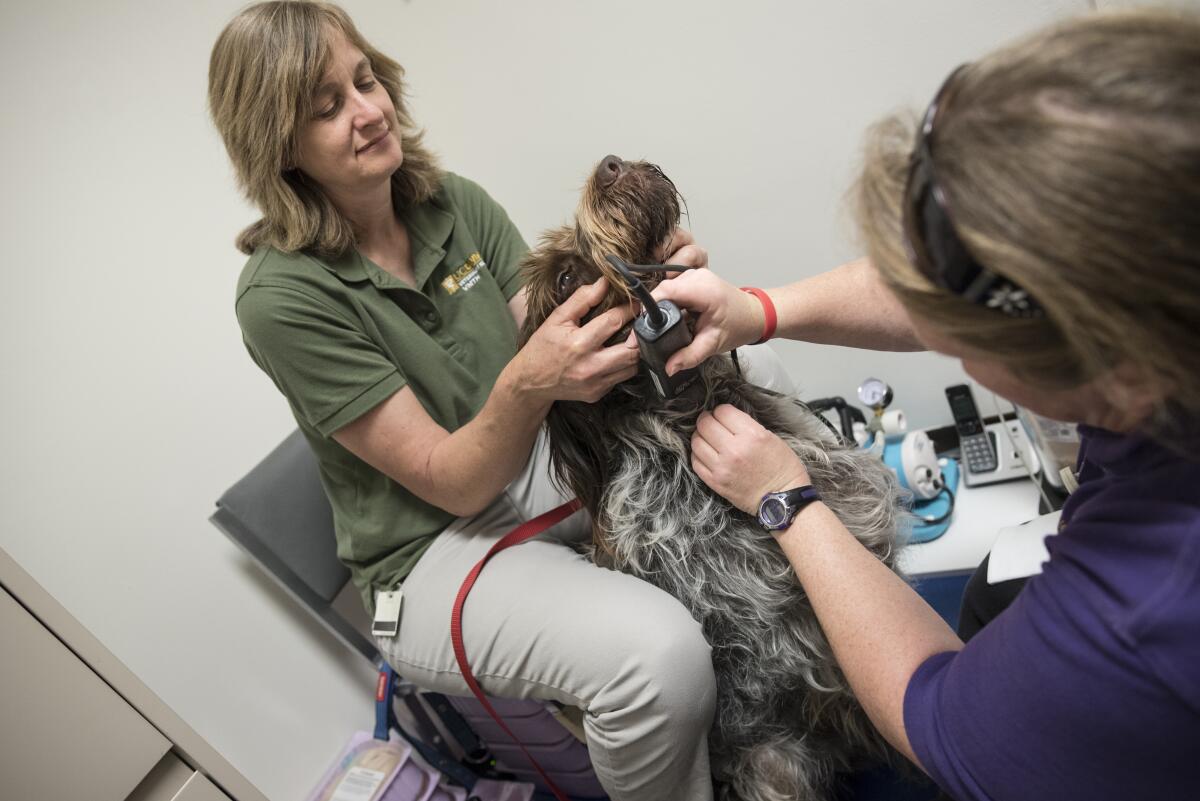Caged dogs used to be sole source of canine blood supply in California. That’s about to change

- Share via
SACRAMENTO — California will phase out the controversial use of blood from caged dogs in pet hospitals under a bill signed by Gov. Gavin Newsom on Saturday.
Under the new law, veterinarians in the state will be able to operate canine blood banks similar to the voluntary model used for people, which is anticipated to help increase the amount of lifesaving supplies needed to heal injured or ailing pets.
A national shortage of dog blood has left veterinarians scrambling for limited supplies.
California currently requires that all animal blood purchased by veterinarians come from two privately owned companies that house hundreds of donor dogs at their facilities for the sole purpose of collecting their blood. Animal rights groups have accused these facilities of mistreating donor dogs, but substantiating those claims is difficult because the companies have sweeping exemptions from public records laws, including sealing their state inspection records.
Those records exemptions will no longer exist under Assembly Bill 1282 starting Jan. 1. Under the bill, the phase-out of closed-colony donor dog facilities will begin after supplies from the voluntary donation system meet veterinary demand, a timeline meant to ensure the shift does not worsen existing shortages.
“These community blood banks for animals are similar to human models in that they collect blood from pets whose owners voluntarily consent to the donation,” said Assemblyman Richard Bloom (D-Santa Monica), the bill’s author, during a July legislative hearing. “California is the only state in the country that requires animal blood to come from so-called closed colonies that keep hundreds of animals confined for years for the sole purpose of harvesting their blood.”
Newsom vetoed a bill in 2019 by state Sen. Scott Wilk (R-Saugus) that would have allowed dog owners to volunteer their pets to donate blood while continuing to allow the two private companies with closed colonies to operate. At the time, Newsom said he wanted legislators to send him a bill that would phase out using dogs “kept in cages for months and years to harvest their blood for sale.”
That approach was included in this year’s bill.
The bill requires the California Department of Food and Agriculture to phase out the use of blood from captive donor dogs within 18 months of determining that community blood banks have sold as much dog blood to veterinarians as the private companies with closed colonies. It’s unclear when voluntary donations would outpace the amount of blood products coming from closed colonies.
The operators of the two animal blood banks in California — Hemopet and Animal Blood Resources International — say closed-colony blood banks ensure a consistent and safe supply of blood with minimal exposure to pathogens and diseases.
The owner of Hemopet, which is in Garden Grove, has said previously that more than 200 greyhounds are housed as blood donors at the facility. Greyhounds are typically chosen because of their generally docile temperament and their “universal” blood type, which can be used to treat any breed.
Dixon-based Animal Blood Resources International, which has disclosed little about its operations, raised objections to the bill, saying that when captive colony operations are phased out, the “canine blood supply would fall off a cliff.”
“We remain concerned that pets in California and their owners will not have the blood products they need after the trigger is pulled,” said the company’s lobbyist, Jeffrey Leacox, at a hearing in July.
However, Dr. Jeannine Berger, a veterinarian and a senior vice president with the San Francisco SPCA, said the bill Newsom signed balances the needs of pets now with the needs of captive donor dogs.
“I am very excited to see California take this step,” Berger said in a statement after the bill passed the Legislature. “Veterinarians regularly face a lack of lifesaving blood and blood products to respond to emergencies, leaving animals and families in deep — and avoidable — distress. With Gov. Newsom’s signature on AB 1282, California will reduce the suffering of many animals and the people who love them.”
More to Read
Sign up for Essential California
The most important California stories and recommendations in your inbox every morning.
You may occasionally receive promotional content from the Los Angeles Times.











